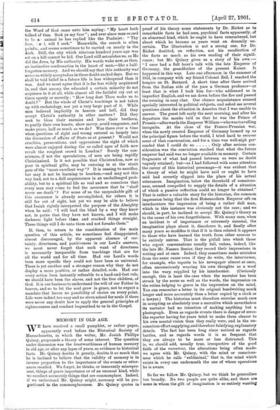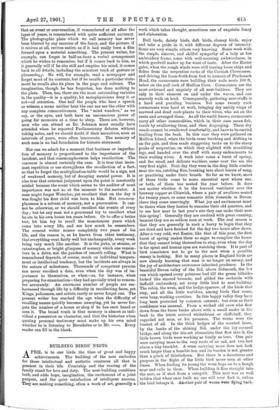MEMORY IN OLD AGE.
WE have received a small pamphlet, or rather paper, apparently read before the Historical Society of Massachusetts, in which the writer, Mr. Josiah Phillips Quincy, propounds a theory of some interest. The question under discussion was the trustworthiness of human memory in old age, or after any lapse of years, as evidence to historical facts. Mr. Quincy doubts it greatly, doubts it so much that he is inclined to believe that the validity of memory is in inverse proportion to the importance of the events or utter- ances recalled. We forget, he thinks, or innocently misrepre- sent, things of grave importance or of an unusual kind, while we recollect accurately things that are commonplace. Indeed, if we understand Mr. Quincy aright, accuracy will be pro- portioned to the commonplaceness. Mr. Quincy quotes in proof of his theory some statements by Dr. Richet as to remarkable facts he had seen, psychical facts apparently, of an abnormal kind, which he ought to have remembered, but about which he became as years went on dreamily un- certain. The illustration is not a strong one, for Dr. Richet doubted, on reflection, not his recollection of the facts so much as his own reading of their signifi- cance; but Mr. Quincy gives us a story of his own :— "I once had a full hour's talk with the late Emperor of Germany, the grandfather of the present Kaiser. It happened in this way. Late one afternoon in the summer of 1851, in company with my friend Colonel Zell, I reached the hospice on St. Bernard. A short time after there arrived from the Italian side of the pass a German professor—at least that is what I took him for—who addressed us in imperfect English, and we sat down before the fire and passed the evening in easy chat. Our chance acquaintance seemed specially interested in political subjects, and asked me several questions about the situation in America that I was unable to answer. The guest left early the next morning, and after his departure the monks told us that he was the Prince of Prussia—afterwards the Emperor William—who was travelling incognito. At the close of the Franco-Prussian war, when the newly created Emperor of Germany loomed up as the principal figure before the world, I tried hard to recover some of that conversation, and for a time was well-nigh per- suaded that I could do so Only after serious con- sideration was the conviction reached that what the future emperor had said was no longer available in memory. Certain fragments of what had passed between us were no doubt vaguely retained; but—as I had followed with some attention the career of this historical personage—it was evident that a theory of what he might have said or ought to have said had covertly slipped into the place of his actual utterances. Imagination, below the threshold of conscious- ness, seemed compelled to supply the details of a situation of which a passive reflection could no longer be obtained." That is rather a valuable story for the historian, the common impression being that the first Hohenzollern Emperor 'eft on interlocutors the impression of being a rather dull man, which in this instance was obviously not the case ; and we should, in part, be inclined to accept Mr. Quincy's theory as to the cause of his own forgetfulness. With many men, when an incident is of importance or extremely unusual, the imagination plays about it, discolours it, and finally after many years so modifies it that if it is then related it appears to those who have learned the truth from other sources to be entirely untrue. That is the pitfall into which those who report conversations usually fall, unless, indeed, like the late Mr. Nassau Senior, they record their impressions in writing and at once. Indeed, they sometimes make mistakes from the same cause even if they do write, the interviewer, for example, who reports to his newspaper almost at once, often unconsciously weaving his own thoughts as a woof into the warp supplied by his interlocutor. (Curiously enough, this is least the case when the narrator has been struck by the scene as well Its the words, the impression on the retina helping to grave in the impression on the mind. You can remember a letter in its original handwriting much longer and more accurately than a letter copied by a clerk or a lawyer.) The historian must therefore exercise much care in accepting as absolutely true a narrative which nevertheless its narrator had no intention of making anything but a photograph. Even as regards events there is danger of error, the reporter having for years tried to make them clearer to his own mental vision than they really were, and in the un- conscious effort supplying, and therefore falsifying, explanatory details. The fact has been long since noticed as regards battles, and as regards words it is so frequent that they are always to be more or less distrusted. This is, we should add, usually true, irrespective of the good faith of the raconteur, the alterations being often made. we agree with Mr. Quincy, with the mind or conscious- ness which he calls "subliminal," that is, the mind which exists in every one underneath the one of whose operations he is aware.
So far we follow Mr. Quincy, but we think he generalises too broadly. No two people are quite alike, and there are some in whom the gift of imagination is so entirely wanting that an event or conversation, if remembered at all after the lapse of years, is remembered with quite sufficient accuracy. The photographic plate which we call memory has never been blurred by any exercise of the fancy, and the picture, if it revives at all, revives entire, as if it had really been a film formed upon a material something. The present writer, for example, can forget in half-an-hour a verbal arrangement which he wishes to remember, but if it comes back to him, as it generally will if he sits still and empties his mind, it comes back in all details, including the minutest trick of gesture or phraseology. He will, for example, read a newspaper and forget most of its contents, but if he recalls a particular state- ment he recalls also its place in the page and column. The imagination, though he has forgotten, has done nothing to the plate. Then, too, there are the most astounding varieties in the quality—it is a quality, let metaphysicians deny it or not—of attention. One half the people who hear a speech or witness a scene neither hear the one nor see the other with any complete consecutiveness. The "mind wanders," as we say, or the eyes, and both have an unconscious power of going for moments at a time to sleep. There are, however, men who can attend as Dr. Johnson must usually have attended when he reported Parliamentary debates without taking notes, and we should doubt if their narratives, even at intervals of years, were often inaccurate. The memory of such men is no bad foundation for historic statement.
Nor can we admit for a moment that haziness or imperfec- tion of memory is proportioned to the importance of the incident, and that commonplaceness helps recollection. The converse is almost certainly the case. It is true that inces- sant repetition or use strengthens the recollection of a fact, so that to forget the multiplication-table would be a sign, not of weakened memory, but of decaying mental power. It is also true that external judgment upon the point is constantly misled because the event which seems to the auditor of most importance was not so at the moment to the narrator. A man might forget Waterloo, yet recollect that on the day it was fought his first child was born to him. But common- placeness is a solvent of memory, not a provocative. It can- not be otherwise, or we should recollect the events of every day; but let any man not a gourmand try to recollect what he ate in his own house ten years before. Or to offer a better test, let him try to recall the monotonous years which come into every life, and see how much he remembers. The nresent writer misses completely two years of his life, and the reason is, as he knows from other testimony, that everything went fairly well but unchangeably, every week being very much like another. It is the jerks, or strains, or catastrophes, or bright glimpses of scenery which one remem- bers in a drive, not the patches of smooth rolling. What is remembered depends, of course, much on individual tempera- ment or intellectual tendency, but the incidents are always in the nature of milestones. Thousands of competent persons can never recollect a date, even when the day was of im- portance to themselves, or when—as, for instance, when preparing for examination—they had specially tried to remem- ber accurately. An enormous number of people are em- barrassed through life by a difficulty in recollecting faces, yet Kings, policemen, and artists rarely or never forget one. The present writer has reached the age when the difficulty of recalling names quickly becomes annoying, yet he never for- gets the number of a house or shop if he has once heard or seen it. The broad truth is that memory is almost as indi- vidual a possession as character, and that the historian when quoting personal testimony must make up his own mind whether he is listening to Herodotus or to Mr. Every reader can fill in the blank.























































 Previous page
Previous page